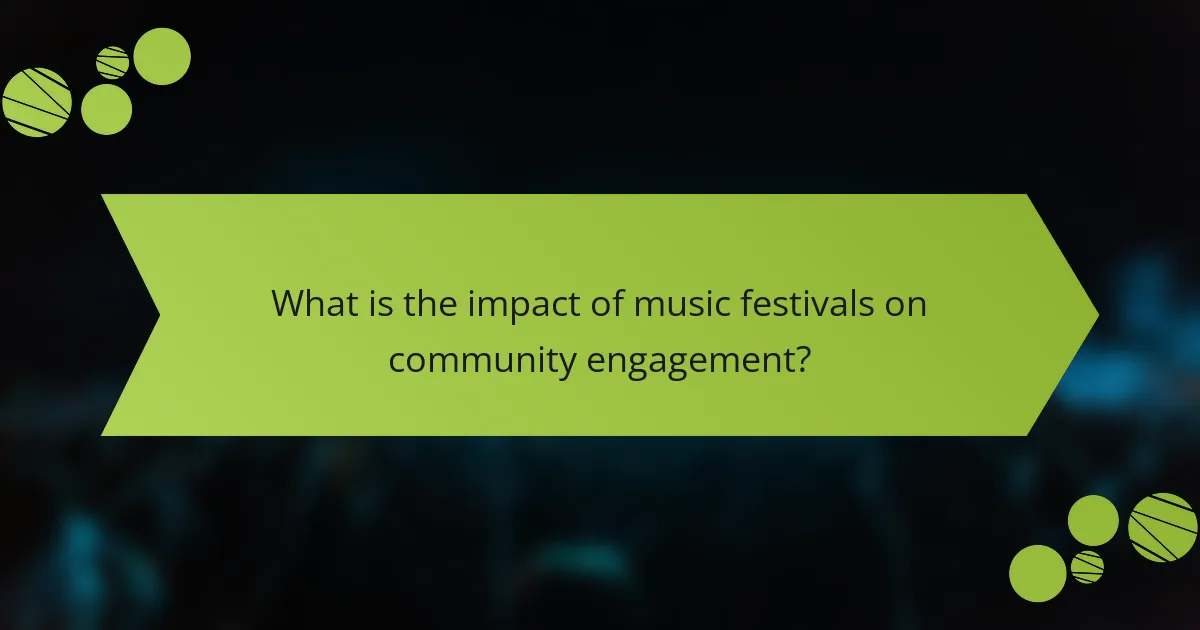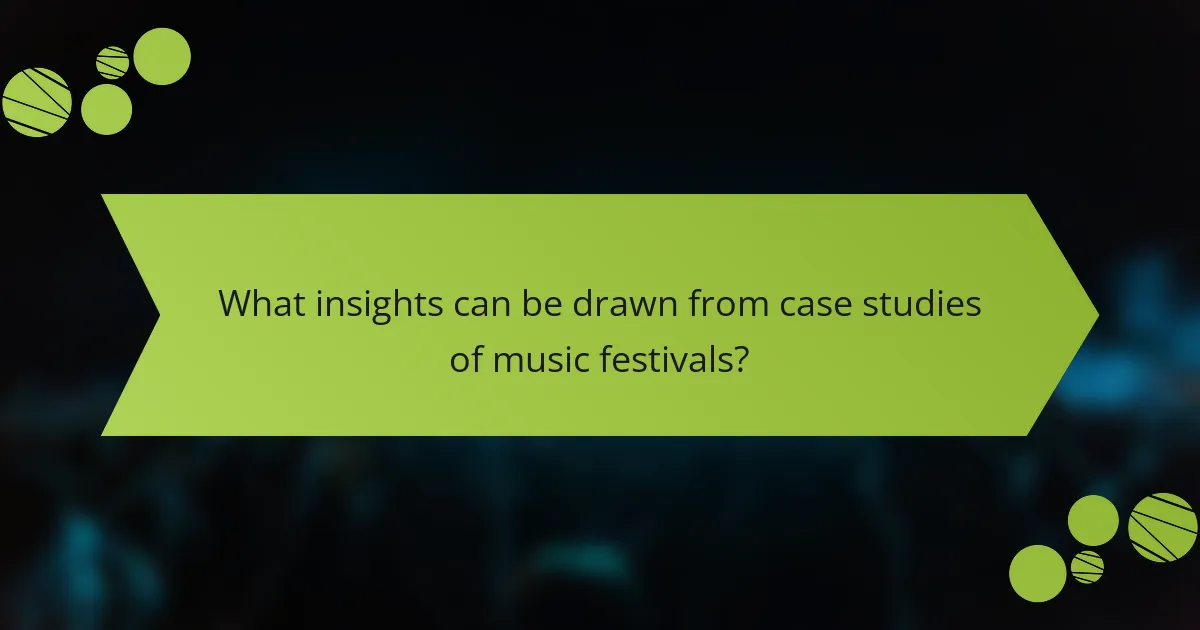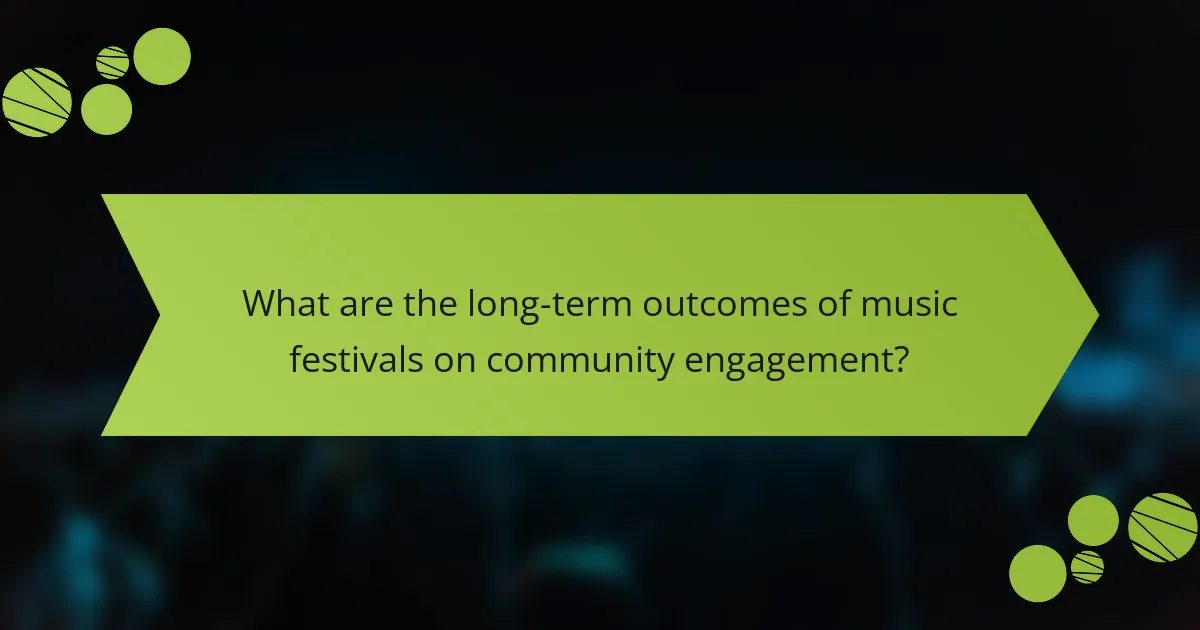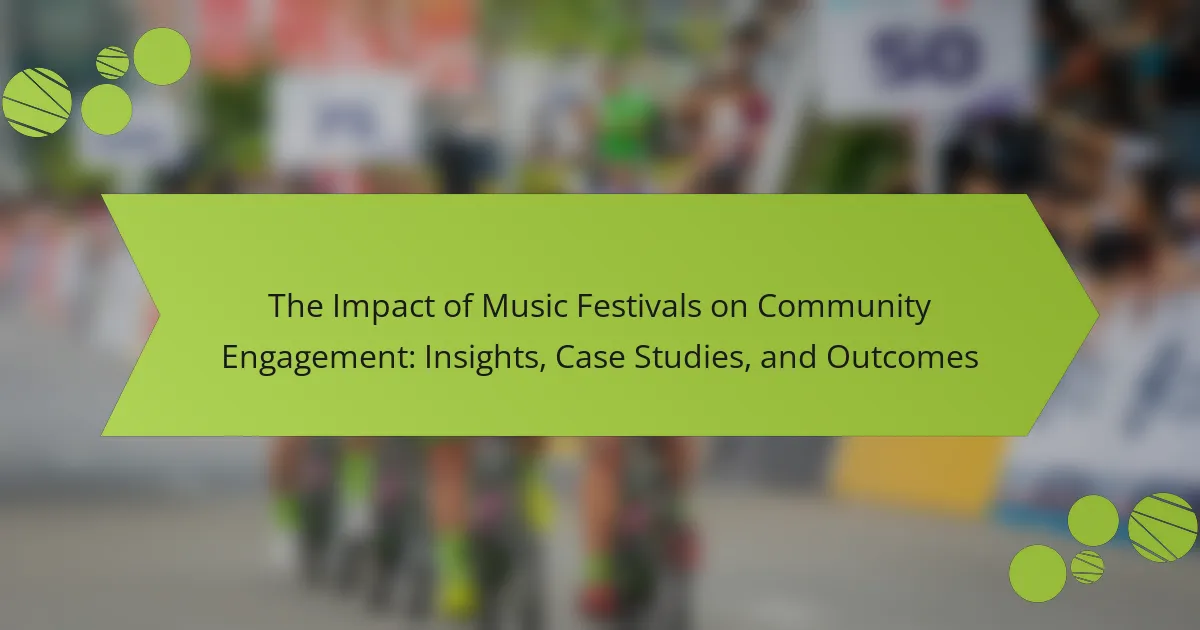Music festivals play a crucial role in enhancing community engagement by fostering social interaction, civic participation, and economic growth. These events create a sense of belonging among attendees, strengthen local identity, and support local artists and businesses. Research indicates that music festivals can lead to significant economic benefits, such as increased tourism and spending, while also promoting volunteerism and collaboration within communities. Case studies highlight the long-term outcomes of music festivals, demonstrating their capacity to improve social cohesion and cultivate a culture of active participation among residents. Overall, the impact of music festivals extends beyond entertainment, serving as a catalyst for community cohesion and cultural exchange.

What is the impact of music festivals on community engagement?
Music festivals significantly enhance community engagement. They foster social interaction among attendees. Festivals create a sense of belonging and shared experience. Local economies benefit from increased tourism and spending. According to a study by the National Endowment for the Arts, community festivals boost civic participation. They encourage volunteerism and collaboration among residents. Festivals also provide a platform for local artists and businesses. This strengthens community identity and pride. Overall, music festivals serve as a catalyst for community cohesion and cultural exchange.
How do music festivals foster community involvement?
Music festivals foster community involvement by creating shared experiences among attendees. They bring together diverse groups, encouraging social interaction and collaboration. Local businesses benefit from increased foot traffic and sales during these events. Festivals often feature local artists, promoting regional talent and culture. Volunteering opportunities arise, allowing community members to contribute actively. Studies show that music festivals can enhance community pride and identity. According to a report by the National Endowment for the Arts, such events strengthen community bonds and networks. Overall, music festivals serve as a catalyst for community engagement and development.
What are the key factors that encourage participation in music festivals?
Key factors that encourage participation in music festivals include the lineup of artists, the festival atmosphere, and social connections. A diverse lineup attracts various audiences. Festivals offering unique experiences, such as art installations or workshops, enhance engagement. The atmosphere plays a crucial role; vibrant environments encourage attendance. Social connections, including friends attending together, increase likelihood of participation. Additionally, marketing strategies, such as early bird ticket sales, create urgency. Accessibility, including location and transportation options, also influences attendance. Research shows that festivals with strong community involvement foster greater participation.
How do music festivals create a sense of belonging among community members?
Music festivals create a sense of belonging among community members through shared experiences and collective enjoyment. Attendees engage in communal activities like dancing, singing, and socializing. These interactions foster connections and friendships. Festivals often showcase local talent, enhancing community pride. The atmosphere promotes inclusivity and acceptance among diverse groups. Research shows that participants feel more connected to their community post-event. For instance, a study by the National Endowment for the Arts found that 72% of festival-goers reported increased feelings of community belonging. This collective engagement strengthens social ties and encourages ongoing community involvement.
What are the social benefits of music festivals for communities?
Music festivals provide significant social benefits for communities. They foster a sense of belonging among attendees. This sense of community can enhance social cohesion. Music festivals often bring together diverse groups of people. They promote cultural exchange and understanding. Festivals can stimulate local economies through increased tourism. They create opportunities for local artists and vendors. According to a study by the National Endowment for the Arts, community events like music festivals can enhance civic engagement. This engagement leads to stronger community ties and improved quality of life.
How do music festivals enhance local cultural identity?
Music festivals enhance local cultural identity by showcasing regional traditions and artistic expressions. They provide a platform for local artists to perform and gain recognition. This exposure fosters community pride and strengthens cultural ties. Festivals often incorporate local cuisine, crafts, and history, creating an immersive cultural experience. According to a study by the National Endowment for the Arts, such events can increase community engagement and participation in cultural activities. Additionally, music festivals attract tourism, which can economically benefit local businesses. This influx of visitors further highlights and promotes the unique aspects of the local culture. Overall, music festivals serve as a celebration of local identity and heritage.
What role do music festivals play in social cohesion?
Music festivals play a significant role in fostering social cohesion. They bring diverse groups of people together in a shared space. This interaction promotes a sense of belonging among attendees. Festivals often encourage collaboration and communication among participants. They create opportunities for cultural exchange and understanding. Studies show that music festivals can strengthen community ties. For example, a report by the National Endowment for the Arts highlights how festivals enhance community identity. This shared experience can lead to lasting friendships and networks. Overall, music festivals serve as a platform for unity and collective enjoyment.

What insights can be drawn from case studies of music festivals?
Case studies of music festivals reveal significant insights into community engagement. They demonstrate how festivals foster local economic growth. For example, a study on the Coachella Valley Music and Arts Festival indicated a $403 million economic impact on the local economy. Additionally, case studies show that festivals enhance social cohesion among community members. They often bring diverse groups together, fostering a sense of belonging. Research also indicates that music festivals can improve community identity. Events like the Glastonbury Festival contribute to local pride and cultural heritage. Moreover, studies highlight the role of festivals in promoting volunteerism. Many festivals rely on local volunteers, creating a sense of ownership and participation. Overall, these insights underscore the multifaceted benefits of music festivals on community dynamics.
What are notable examples of music festivals that have improved community engagement?
Notable examples of music festivals that have improved community engagement include the New Orleans Jazz & Heritage Festival and the Newport Folk Festival. The New Orleans Jazz & Heritage Festival celebrates local culture and music. It fosters community by involving local artists and vendors. This festival generates significant economic impact for the region, estimated at over $300 million annually. The Newport Folk Festival promotes collaboration among musicians and local businesses. It encourages community participation through workshops and volunteer opportunities. Both festivals have successfully strengthened local identity and pride. They serve as platforms for social connection and cultural exchange.
How did specific music festivals implement community-driven initiatives?
Specific music festivals implemented community-driven initiatives through local artist showcases, workshops, and sustainability programs. Festivals like Coachella featured local artists to promote regional talent. Bonnaroo organized workshops that engaged attendees in community issues. Lollapalooza partnered with local nonprofits for environmental initiatives. These actions fostered community involvement and support. Research shows that such initiatives increase local economic impact and strengthen community ties. Festivals reported higher attendance and participation when engaging the community directly.
What measurable outcomes emerged from these community engagement efforts?
Measurable outcomes from community engagement efforts at music festivals include increased local business revenue and enhanced community cohesion. Studies indicate that music festivals can boost local economies by up to 30%. Surveys show improved community relationships, with 75% of attendees reporting stronger connections with neighbors. Additionally, volunteer participation often rises, with many festivals seeing a 40% increase in local volunteerism. These outcomes demonstrate the positive impact of music festivals on community engagement and local development.
What lessons can be learned from successful music festival case studies?
Successful music festival case studies reveal key lessons in community engagement and event management. First, strong local partnerships enhance festival success. Collaborating with local businesses and organizations fosters community support. Second, effective marketing strategies attract diverse audiences. Utilizing social media and targeted campaigns increases visibility and ticket sales. Third, prioritizing sustainability resonates with attendees. Festivals that implement eco-friendly practices often gain positive public perception. Fourth, creating inclusive environments encourages participation from various demographics. Festivals that celebrate diversity foster a sense of belonging. Lastly, thorough planning and risk management are crucial. Successful festivals often conduct comprehensive assessments to mitigate potential issues. These lessons underline the importance of community involvement and strategic planning in music festival success.
How can other communities replicate the success of these music festivals?
Communities can replicate the success of music festivals by implementing strategic planning and collaboration. First, they should identify local talent and resources to feature in the festival. Engaging local artists fosters community pride and participation. Next, establishing partnerships with local businesses can enhance sponsorship opportunities and logistics. Research shows that festivals with strong local partnerships see increased attendance and economic benefits.
Communities should also invest in marketing efforts to attract a diverse audience. Utilizing social media and local media outlets can effectively promote the event. Additionally, gathering feedback from attendees post-festival can inform future improvements. According to a study by the National Endowment for the Arts, community engagement increases when festivals incorporate attendee input.
Finally, ensuring accessibility and inclusivity can broaden participation. Festivals that cater to various demographics often achieve greater success. By focusing on these key areas, communities can effectively replicate the success of established music festivals.
What challenges did these festivals face and how were they overcome?
Music festivals faced several challenges, including logistical issues, funding shortages, and community resistance. Logistical issues often arose from managing large crowds and coordinating transportation. To overcome these, organizers implemented better planning and communication strategies. Funding shortages were common, especially for new festivals. Organizers secured sponsorships and partnerships to ensure financial stability. Community resistance often stemmed from noise concerns and traffic disruptions. Organizers engaged with local residents through meetings and surveys to address these concerns. By fostering dialogue, they built community support and improved festival experiences.

What are the long-term outcomes of music festivals on community engagement?
Long-term outcomes of music festivals on community engagement include increased social cohesion and enhanced local identity. Music festivals often bring diverse groups together, fostering connections among attendees. Over time, these events can lead to stronger community bonds and a sense of belonging.
Research shows that communities hosting music festivals experience economic benefits. According to a study by the National Endowment for the Arts, festivals can boost local economies by attracting tourism and supporting local businesses.
Additionally, music festivals can encourage volunteerism and civic participation. Many festivals rely on local volunteers, creating opportunities for residents to engage actively in their community.
Long-term, this involvement can cultivate a culture of collaboration and support among community members. Studies indicate that sustained engagement in community events leads to higher levels of civic responsibility and participation in local governance.
Overall, music festivals can significantly enhance community engagement through social, economic, and participatory outcomes.
How do music festivals contribute to local economic development?
Music festivals contribute to local economic development by generating revenue and creating jobs. They attract tourists, which increases spending in local businesses. Festivals lead to higher demand for accommodation, food, and transportation services. A study by the National Endowment for the Arts found that festivals can generate millions in economic impact. For example, the Coachella Valley Music and Arts Festival generates approximately $403 million annually for the local economy. Additionally, local vendors benefit from increased sales during these events. Overall, music festivals serve as a catalyst for economic growth in host communities.
What impact do music festivals have on local businesses?
Music festivals significantly boost local businesses. They increase foot traffic in the area. Local restaurants, hotels, and shops experience higher sales during festivals. A study by the National Endowment for the Arts found that festivals can generate millions in revenue for local economies. For instance, the South by Southwest festival in Austin, Texas, reportedly contributed over $350 million to the local economy in 2019. Festivals create job opportunities, both temporary and permanent. They often lead to increased visibility for local brands and services. Overall, music festivals serve as a catalyst for economic growth in host communities.
How do music festivals influence tourism in the community?
Music festivals significantly boost tourism in communities. They attract large crowds, increasing visitor numbers. This influx generates revenue for local businesses, including hotels, restaurants, and shops. Festivals often lead to job creation in event management and hospitality. For example, the Coachella Valley Music and Arts Festival draws over 250,000 attendees annually. This event alone contributes approximately $403 million to the local economy. Additionally, music festivals enhance community visibility and cultural reputation. They can promote local artists and traditions. Overall, music festivals serve as powerful catalysts for tourism development in communities.
What strategies can communities adopt to maximize the benefits of music festivals?
Communities can adopt several strategies to maximize the benefits of music festivals. First, they can promote local artists to enhance community engagement. This allows residents to connect with performers from their area. Second, communities should involve local businesses in festival planning. This fosters economic growth through increased sales and visibility. Third, establishing partnerships with local organizations can broaden outreach and participation. Collaborating with schools and nonprofits can attract diverse audiences. Fourth, creating volunteer opportunities can enhance community involvement and ownership. Engaging residents in festival operations builds a sense of pride. Fifth, implementing sustainable practices can attract environmentally conscious attendees. This can include waste reduction and local sourcing of materials. Lastly, conducting post-festival surveys can gather feedback for future improvements. Collecting data helps refine strategies and enhance future events.
What best practices should be followed when organizing a music festival?
Organizing a music festival requires careful planning and execution. First, define clear goals and objectives for the festival. This helps in aligning all efforts towards common outcomes. Second, select an appropriate venue that can accommodate the expected audience size. The venue should have essential facilities such as restrooms, parking, and accessibility options.
Third, secure necessary permits and licenses well in advance. Compliance with local regulations is crucial for a successful event. Fourth, create a detailed budget that accounts for all expenses including artist fees, equipment rentals, and marketing costs. This ensures financial stability throughout the planning process.
Fifth, curate a diverse lineup of artists to attract a wider audience. Research indicates that festivals with varied genres see higher attendance rates. Sixth, implement a comprehensive marketing strategy utilizing social media, local press, and partnerships. Effective promotion increases visibility and ticket sales.
Seventh, prioritize safety and security measures. This includes hiring professional security staff and having a clear emergency response plan. According to industry standards, a well-prepared safety plan is essential for managing large crowds.
Eighth, engage with the community to foster support and participation. Collaboration with local businesses and organizations enhances community ties and boosts attendance. Following these best practices can lead to a successful and impactful music festival.
How can communities ensure inclusivity and accessibility at music festivals?
Communities can ensure inclusivity and accessibility at music festivals by implementing specific measures. These measures include providing accessible pathways and facilities for individuals with disabilities. They should offer sign language interpreters for performances and announcements. Communities can also create designated quiet areas for those needing sensory breaks. Additionally, ticketing options should include affordable pricing and scholarships for underrepresented groups. Engaging with local advocacy groups helps identify specific needs and barriers. Surveys before the event can gather feedback on accessibility concerns. These actions contribute to a more inclusive environment, enhancing the overall festival experience for everyone.
The main entity of the article is music festivals and their impact on community engagement. The article explores how music festivals enhance social interaction, foster local economies, and create a sense of belonging among community members. It highlights key factors that encourage participation, social benefits, and the role of festivals in strengthening local cultural identity. Additionally, it examines case studies and measurable outcomes of successful festivals, providing insights into community-driven initiatives and strategies for maximizing benefits. Overall, the article underscores the multifaceted contributions of music festivals to community cohesion and economic development.
